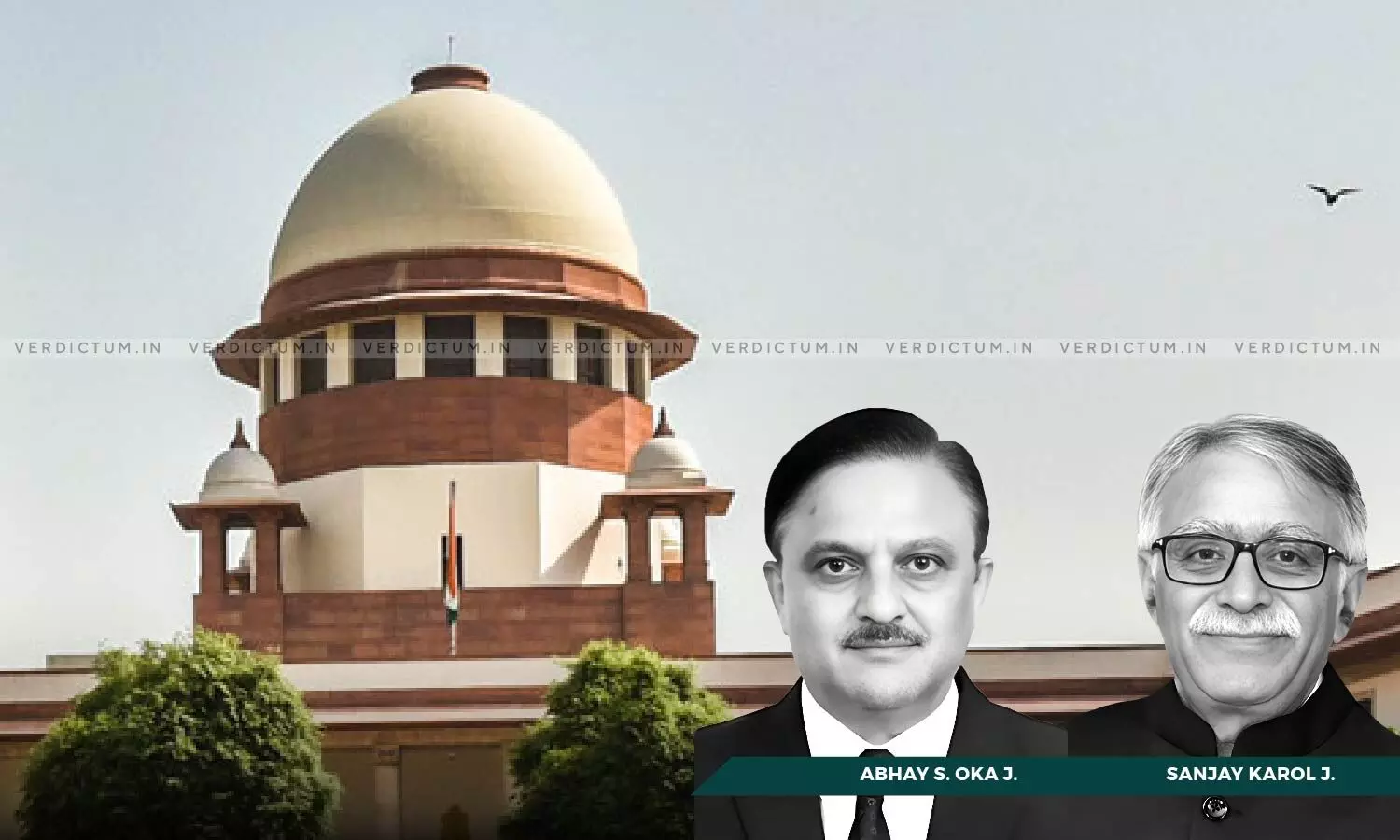
Section 59 Food Safety and Standards Act Overrides Sections 272 & 273 IPC: Supreme Court
 |
|The Supreme Court held that Section 59 of Food Safety and Standards Act, 2006 (FSSA), will override the provisions of Sections 272 and 273 of the Indian Penal Code (IPC).
The Court held thus in a batch of appeals in which the issue was about the interplay between the provisions of Chapter IX of FSSA and Sections 272 and 273 of the IPC.
The two-Judge Bench of Justice Abhay S. Oka and Justice Sanjay Karol observed, “The settled law is that if the main Section is unambiguous, the aid of the title of the Section or its marginal note cannot be taken to interpret the same. Only if it is ambiguous, the title of the section or the marginal note can be looked into to understand the intention of the legislature. Therefore, the main Section clearly gives overriding effect to the provisions of the FSSA over any other law in so far as the law applies to the aspects of food in the field covered by the FSSA. In this case, we are concerned only with Sections 272 and 273 of the IPC. When the offences under Section 272 and 273 of the IPC are made out, even the offence under Section 59 of the FSSA will be attracted. In fact, the offence under Section 59 of the FSSA is more stringent.”
The Bench said that the concept of unsafe food is more comprehensive than the concept of adulterated food and that an unsafe food means an article of food whose nature, substance or quality is so affected as to render it injurious to health.
Advocate Garvesh Kabra appeared for the appellant while Senior Advocate Maninder Singh appeared for the respondents.
Brief Facts -
The appellant had challenged the order passed by the Allahabad High Court dismissing a petition under Section 482 of the Criminal Procedure Code (CrPC) seeking quashing of the prosecution for the offences punishable under Sections 272 and 273 of IPC. In 2010, the Uttar Pradesh State had issued an order granting power to the authorities to initiate prosecutions under the said provisions of IPC as well as under the Prevention of Food Adulteration Act, 1954 (PFA). Thereafter, an FIR was lodged by a food inspector representing the Regional Food Controller, Agra against the appellant alleging the commission of said offences.
The allegation was that though the appellant did not possess a licence to sell the commodity of mustard oil, he continued to carry on the business of sale and that he had adulterated the mustard oil, edible oil, and rice bran oil. He approached the High Court to quash the FIR on various grounds. However, the High Court dismissed his petition holding that the police has no authority or jurisdiction to investigate a case under the FSSA. Hence, he was before the Apex Court.
The Supreme Court after considering the submissions of the counsel noted, “… there are very exhaustive substantive and procedural provisions in the FSSA for dealing with offences concerning unsafe food. In this context, we must consider the effect of Section 89 of the FSSA. … The title of the section indeed indicates that the intention is to give an overriding effect to the FSSA over all ‘food-related laws’. However, in the main Section, there is no such restriction confined to ‘food-related laws’, and it is provided that provisions of the FSSA shall have effect notwithstanding anything inconsistent therewith contained in any other law for the time being in force.”
The Court said that the Section indicates that an overriding effect is given to the provisions of the FSSA over any other law. It referred to the case of State of Maharashtra & Anr. v. Sayyed Hassan Sayyed Subhan & Ors. (2019) 18 SCC 145 in which the question of the effect of Section 97 of the FSSA did not arise for consideration of the court and that the court dealt with simultaneous prosecutions and concluded that there could be simultaneous prosecutions, but conviction and sentence can be only in one.
“This proposition is based on what is incorporated in section 26 of the GC Act. We have no manner of doubt that by virtue of Section 89 of the FSSA, Section 59 will override the provisions of Sections 272 and 273 of the IPC. Therefore, there will not be any question of simultaneous prosecution under both the statutes”, it concluded.
Accordingly, the Apex Court allowed the appeals and set aside the impugned orders.
Cause Title- Ram Nath v. The State of Uttar Pradesh & Ors. (Neutral Citation: 2024 INSC 138)
Appearance:
Appellant: AOR Garvesh Kabra, Advocates Abhishek Jaju, Pooja Kabra, Avanish Deshpande, AOR Ambhoj Kumar Sinha, Advocates Vinod Pandey, Priyadarshi Kumar, Yadunandan Bansal, Ravinder Kumar Singh, Ali Rahim, Shalini Jain, and Mohsin Rahim.
Respondents: Senior Advocate Maninder Singh, Sr. A.A.G. Ardhendumauli Kumar Prasad, ASG Vikramjit Banerjee, AOR Dheeraj Nair, Advocates Kumar Kislay, Avni Sharma, Ridhima Sharma, Ajay Sabharwal, Ashita Chawla, AORs Niranjana Singh, Siddharth Singla, Vishnu Shankar Jain, Advocates Abhishek Singh, Nachiketa Joshi, Navanjay Mahapatra, Sucheta Joshi, Himadri Haksar, T.S.Sabarish, AORs Gurmeet Singh Makker, Vishwa Pal Singh, Himanshu Shekhar, Advocates Parth Shekhar, Ambali Vedasen, Shubham Singh, Jamnesh Kumar, Tarun Bajaj, Rachna Ranjan, Mahesh Y Reddy, Sameer Mehndiratta, Rajat Sinha Roy, Darshan Chandrakant Siddarkar, Monica Haseja, Md Sontu Mia, and Chandra Sekar.